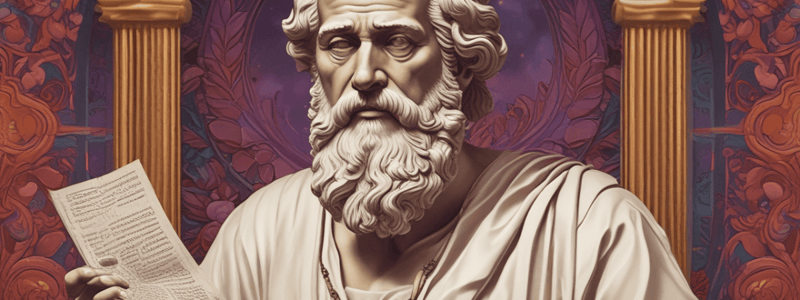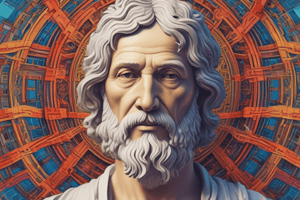Podcast
Questions and Answers
Who is considered the father of cognitive psychology?
Who is considered the father of cognitive psychology?
- Alexander the Great
- King Philip II
- Plato (correct)
- Aristotle
Which philosopher believed forms could be discovered by looking outward?
Which philosopher believed forms could be discovered by looking outward?
- Aristotle
- Alexander the Great
- Plato (correct)
- King Philip II
Who wrote the first psychology book, 'De Anima'?
Who wrote the first psychology book, 'De Anima'?
- Plato
- Aristotle (correct)
- King Philip II
- Alexander the Great
Which philosopher embraced both rationalism and empiricism?
Which philosopher embraced both rationalism and empiricism?
What did Aristotle primarily study before becoming a tutor to Alexander the Great?
What did Aristotle primarily study before becoming a tutor to Alexander the Great?
Where did Aristotle establish a school that later became like a modern university?
Where did Aristotle establish a school that later became like a modern university?
What is the role of the mind in gathering knowledge?
What is the role of the mind in gathering knowledge?
What did Plato believe about knowledge and nature?
What did Plato believe about knowledge and nature?
What is the Efficient Cause according to Aristotle's view?
What is the Efficient Cause according to Aristotle's view?
How did Plato and Aristotle differ in their philosophical approaches?
How did Plato and Aristotle differ in their philosophical approaches?
What is Teleology according to the text?
What is Teleology according to the text?
What role did Aristotle assign to the body in understanding?
What role did Aristotle assign to the body in understanding?
According to the Reminiscence Theory of Knowledge, how do we acquire knowledge?
According to the Reminiscence Theory of Knowledge, how do we acquire knowledge?
What were the three components of the soul according to Plato?
What were the three components of the soul according to Plato?
In Plato's ideal society, what role would individuals with a dominant rational component of the soul have?
In Plato's ideal society, what role would individuals with a dominant rational component of the soul have?
What did Plato believe was the supreme goal in life?
What did Plato believe was the supreme goal in life?
How did Plato view education for children with low aptitude?
How did Plato view education for children with low aptitude?
According to Plato, when are people better able to control their appetites?
According to Plato, when are people better able to control their appetites?
What is the law of contiguity?
What is the law of contiguity?
Which law states that the more experiences occur together, the stronger the association will be?
Which law states that the more experiences occur together, the stronger the association will be?
What is the basis of learning theory for the next 2000 years?
What is the basis of learning theory for the next 2000 years?
What is imagination defined as?
What is imagination defined as?
What is the relationship between imagination and rational thought?
What is the relationship between imagination and rational thought?
What was the author's view on dreams' ability to provide information about the future?
What was the author's view on dreams' ability to provide information about the future?
What did Aristotle believe about dreams and prophecy?
What did Aristotle believe about dreams and prophecy?
What did Aristotle consider to be the motivating force behind human action?
What did Aristotle consider to be the motivating force behind human action?
What did Aristotle consider to be the best way of living?
What did Aristotle consider to be the best way of living?
What did Aristotle believe about human nature?
What did Aristotle believe about human nature?
What did the text suggest about the role of emotions in human behavior?
What did the text suggest about the role of emotions in human behavior?
What did the text highlight about the importance of early Greek philosophy?
What did the text highlight about the importance of early Greek philosophy?
Flashcards are hidden until you start studying
Study Notes
Plato's Legacy
- Roots of cognitive psychology in Plato
- Nativism and rationalism: believed that knowledge is inborn and that mental thinking is how we arrive at truth
- Created a dualism that divided the mind and body
- Writings were warped by future religions
Aristotle
- Background: received training in medicine, became Plato's student at 17, and later tutored Alexander the Great
- Took over the Lyceum, a famed school, and made it like a modern university
- Wrote "De Anima" (On the Soul), considered the first psychology book
- Added substantially to almost every field
The Basic Difference between Plato and Aristotle
- Both focused on the essence of truth, but Aristotle believed that forms could be discovered by looking outward, not inward (studying nature)
- Viewed sensory information in a positive light and embraced both rationalism and empiricism
The Reminiscence Theory of Knowledge
- Believed that one comes to know forms by introspection, searching one's inner understanding
- The soul is a part of the perfect realm of the abstract world, but it is in the body, so it is our access to this knowledge
The Nature of the Soul
- Believed the soul was immortal and consists of the courageous, appetitive, and rational components
- Humans are often in conflict between these aspects, and to gain knowledge, a person has to quiet the two parts that are not rational
- Supreme goal in life is to be freed from the wants of the flesh
Sleep and Dreams
- People are better able to control appetites when awake than asleep
- The mind must be used to gather knowledge, but the object of rationalism is the information of the senses (empiricism)
- Both saw that essences or universals could not be discovered by only looking at one case
Causation and Teleology
- To know anything, we must understand four aspects: material, formal, efficient, and final cause
- Teleology: everything in nature exists for a reason, but not necessarily with conscious intention
- Recall is the actual mental search for a past experience
Laws of Association
- Law of contiguity: when we think of something, we also tend to think of things that were experienced with it
- Law of similarity: when we think of something, we tend to think of things similar to it
- Law of contrast: when we think of something, we also tend to think of things that are the opposite
- Law of frequency: the more experiences occur together, the stronger the association will be
Imagination and Dreaming
- Experiences create images that outlast the actual event that caused them
- These images create the important link between sensation and rational thought
- Imagination: the lingering effect of sensory experiences
- Questioned the reliability of imagination, saying sensations are free of error
Motivation and Emotion
- Happiness is doing what is natural because it fills one's purpose
- Action is always directed at the satisfaction of an appetite
- We can use our rational powers to inhibit appetites
- Using rational abilities leads to the greatest fulfillment
- The best life is lived in moderation, with a perfect balance (the golden mean)
The Importance of Early Greek Philosophy
- Popperian Science consists of specifying a problem, proposing solutions, and attempting to refute those solutions
- Aristotle's death marked the end of the golden age of Greece
Studying That Suits You
Use AI to generate personalized quizzes and flashcards to suit your learning preferences.




